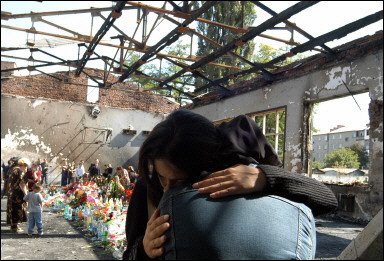 |
|
AFP Photo
Ossetians
comfort each other in the destroyed school gymnasium in Beslan. The
floor at the wrecked gym is covered with flowers and stuffed toys as
grief-stricken residents continue to visit the scene of the drama to
pay their respects to the 336 people, half of them children, who died
in the school siege. The rhetoric is identical, but as Russia echoes
the United States in designating "international terrorism" a top strategic
threat, experts say it lacks the means to turn word into deed to counter
the danger. |
MOSCOW (AFP) - The rhetoric is identical, but as Russia echoes the United
States in designating "international terrorism" a top strategic
threat, experts say it lacks the means to turn word into deed to counter
the danger.
"For both Russia and the United States, international terrorism
is becoming
a perfect propaganda cover, an absolute evil beside which all other forms
of
evil are relative," said Boris Kagarlitsky, a political analyst here.
"But the gap between the aims proclaimed by Moscow and its means
to achieve
those aims is becoming increasingly obvious," he added.
In a speech to the nation three days after hundreds died in a school
hostage
siege in the Russian republic of North Ossetia, President Vladimir Putin
blamed the tragedy on international terrorism and described this as "a
total, brutal, all-out war" against Russia.
After that, Russia placed a multi-million-dollar bounty on the heads
of
Chechen rebel leaders accused of involvement in the attack and warned
of
pre-emptive strikes against "terrorist bases" anywhere in the
world.
The moves bore a striking resemblance to pronouncements by US President
George W. Bush and other officials in Washington in the wake of the
September 11 attacks three years ago, many of which were followed-up with
specific acts.
"Russia decided to respond in the same manner as the United States,"
commented Viktor Kremenyuk, a researcher with the USA-Canada Institute
in
Moscow.
"But America is the only superpower actually capable of taking
on police
duties" on its own territory and around the world, he said.
Sergei Karaganov, chairman of the Foreign Policy and Defense Council,
pointed to commonalities in US and Russian military doctrine regarding
terrorism.
"US military doctrine includes surgical strikes in other countries,"
he
said. "Our military leaders speak of this as well" as part of
a "policy of
disuasion."
But Kremenyuk said making such threats of pre-emptive strikes in the
absence
of any defined targets did more to make the Russian leadership appear
ridiculous than to stop terrorists.
"The United States has an ultra-modern air force which can actually
carry
out surgical strikes while ours doesn't have enough money to buy fuel
for
its planes," Kremenyuk stated.
Putin also promised to reinforce state security bodies, both in size
and in
efficiency -- comments that strongly resembled Bush's announcement that
some
US security agencies would be merged into a new Department of Homeland
Security.
That pledge has been followed with some debate on just how security
can be
strengthened, including a proposal from one Moscow politician to place
a
quota on numbers of some ethnic groups in the city and close it entirely
to
the rest.
But while there was hot debate in the United States on the dangers that
a
government security crackdown posed to civil liberties in the wake of
September 11, the same kind of public discussion was not likely to occur
in
Russia.
Sergei Mitrokhin, the deputy
head of the liberal Yabloko party, said civil society was still too undeveloped
in Russia and media too monopolised by the state to force leaders to respond
to "provocative" questions.
"There have been no attacks in the United States since September
11 because
America learned the lesson," Mitrokhin said.
He noted that a US congressional investigation into security lapses
prior to
the September 11 attacks had created "several uncomfortable moments"
for top
US authorities, while lawmakers here have not even attempted to probe
the
hostage drama at a Moscow theater two years ago.
"Russian bureaucrats spend money not to protect the citizens from
terrorism but to protect the honor of the uniform from public opinion,"
Mitrokhin said.
© AFP 2004
See also:
International
Anti-terror coalition
|